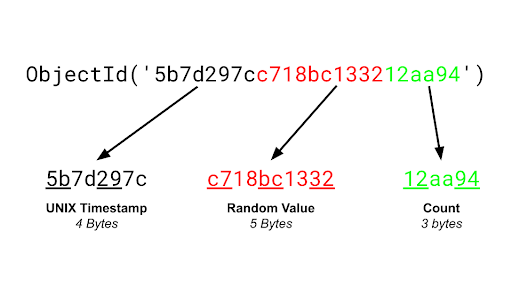BSON Data Types — ObjectId
In this article, learn about the makeup and history of ObjectId and explore binary JSON (BSON).
Join the DZone community and get the full member experience.
Join For Free
In the database world, it is frequently important to have unique identifiers associated with a record. In a legacy, tabular database, these unique identifiers are often used as primary keys. In a modern database, such as MongoDB, we need a unique identifier in an `_id` field as a primary key as well. MongoDB provides an automatic unique identifier for the `_id` field in the form of an `ObjectId` data type.
For those that are familiar with MongoDB Documents, you've likely come across the `ObjectId` data type in the `_id` field. For those unfamiliar with MongoDB Documents, the [ObjectId](https://alger.me/mongodb-objectid) datatype is automatically generated as a unique document identifier if no other identifier is provided. But what is an `ObjectId` field? What makes them unique? This post will unveil some of the magic behind the BSON ObjectId data type. First, though, what is BSON?
You might also be interested in: Data Types in MongoDB
Binary JSON (BSON)
Many programming languages have JavaScript Object Notation (JSON) support or similar data structures. MongoDB uses JSON documents to store records. However, behind the scenes, MongoDB represents these documents in a binary-encoded format called BSON. BSON provides additional data types and ordered fields to allow for efficient support across a variety of languages. One of these additional data types is ObjectId.
Makeup of an ObjectId
Let's start with an examination of what goes into an ObjectId. If we take a look at the construction of the ObjectId value, in its current implementation, it is a 12-byte hexadecimal value. This 12-byte configuration is smaller than a typical universally unique identifier (UUID), which is, typically, 128-bits. Beginning in MongoDB 3.4, an ObjectId consists of the following values:
- 4-byte value representing the seconds since the Unix epoch
- 5-byte random value
- 3-byte counter, starting with a random value

With this makeup, ObjectIds are likely to be globally unique and guaranteed to be unique per collection. Therefore, they make a good candidate for the unique requirement of the `_id` field. While the `_id` in a collection can be an auto-assigned `ObjectId`, it can be user-defined as well, as long as it is unique within a collection. Remember that if you aren't using a MongoDB generated `ObjectId` for the `_id` field, the application creating the document will have to ensure the value is unique.
History of ObjectId
The makeup of the ObjectId has changed over time. Through version 3.2, it consisted of the following values:
- 4-byte value representing the seconds since the Unix epoch,
- 3-byte machine identifier,
- 2-byte process id, and
- 3-byte counter, starting with a random value.
The change from including a machine-specific identifier and process id to a random value increased the likelihood that the `ObjectId` would be globally unique. These machine-specific 5-bytes of information became less likely to be random with the prevalence of Virtual Machines (VMs) that had the same MAC addresses and processes that started in the same order. While it still isn't guaranteed, removing machine-specific information from the `ObjectId` increases the chances that the same machine won't generate the same `ObjectId`.
ObjectId Odds of Uniqueness
The randomness of the last eight bytes in the current implementation makes the likelihood of the same ObjectId being created pretty small. How small depends on the number of inserts per second that your application does. Let's do some quick math and look at the odds.
If we do one insert per second, the first four bytes of the ObjectId would change so we can't have a duplicate ObjectId. What are the odds though when multiple documents are inserted in the same second that *two* ObjectIds are the same? Since there are *eight* bits in a byte, and *eight* random bytes in our Object Id (5 random + 3 random starting values), the denominator in our odds ratio would be 2^(8*8), or 1.84467441x10'^19.
For those that have forgotten scientific notation, that's 18,446,744,100,000,000,000. Yes, that's correct, 18 quintillion and change. As a bit of perspective, the odds of being struck by lightning in the U.S. in a given year are 1 in 700,000, according to National Geographic. The odds of winning the Powerball Lottery jackpot are 1 in 292,201,338. The numerator in our odds equation is the number of documents per second. Even in a write-heavy system with 250 million writes/second, the odds are, while not zero, pretty good against duplicate ObjectIds being generated.
Wrap Up
ObjectId is one data type that is part of the BSON Specification that MongoDB uses for data storage. It is a binary representation of JSON and includes other data types beyond those defined in JSON. It is a powerful data type that is incredibly useful as a unique identifier in MongoDB Documents.
Further Reading
Converting XML to JSON, Raw Use in MongoDB, and Spring Batch
Published at DZone with permission of Ken Alger. See the original article here.
Opinions expressed by DZone contributors are their own.

Comments